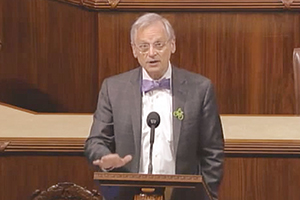Senior Reporter
Bid to Increase Fuel Taxes to Continue Despite Opposition, Blumenauer Says

Rep. Earl Blumenauer is not giving up on his effort to see Congress approve an increase in fuel taxes to fund infrastructure projects.
Despite a move by congressional leaders to put the finishing touches on a highway bill without his proposal, the Oregon Democrat said he is undeterred and will look to gain support for his effort when Congress crafts an overhaul of tax policy sometime toward the end of the year.
“We’ll wait and see how much this holds up and then what we do with a lot of end-of-the-year stuff with budgets and taxes,” the congressman said in an exclusive interview with Transport Topics.
“This is a very weird time in Congress. Things are up and down,” he said Nov. 6. “I think they will put a good-faith effort in it, but who knows, there’s a lot of moving pieces — big issues in terms of budget — that are going to be swirling around.”
In recent years, Blumenauer has sought to win broad support from colleagues on his push to raise federal taxes on diesel and gasoline fuel to pay for infrastructure projects. But Democratic and Republican leaders have not backed his proposal.
The latest setback for Blumenauer occurred Nov. 3, when House Republican leaders blocked his push to attach to a highway bill a provision authorizing an increase in federal fuel taxes by 15 cents over the next three years. After three years, taxes would come out to 39.4 cents, from the existing 24.4 cents per gallon for diesel. For gasoline, the tax would be 33.4 cents per gallon, up from 18.4 cents today.
In blocking the proposal, Blumenauer said the GOP-led House lacked the “vision and courage
of Ronald Reagan.” He also was puzzled by Congress’ move to proceed with a multiyear highway bill that did not strictly rely on diesel and gas tax revenues to fund the country’s transportation network.
“The shell of the bill isn’t bad, but before you get the real promise of a six-year reauthorization, you need six years of steady, dedicated, adequate funding, and this misses on all those counts,” he said, calling the bill’s funding structure “pretty loopy.”
The Senate-passed highway bill relies on non-traditional sources of funding, such as selling barrels of oil from the Strategic Petroleum Reserve, and offsets were found by cutting the annual dividend payments banks receive for holding shares in the Federal Reserve System.
Blumenauer’s proposal had garnered backing from American Trucking Associations, the U.S. Chamber of Commerce, construction firms and other top transportation groups. He said he even won over several Republicans who told him they wanted to see fuel taxes increase.
In the Senate, Blumenauer has a friend in Delaware Democrat Tom Carper, a senior transportation authorizer who has been pushing legislation designed to raise fuel taxes over four years. “We have the biggest coalition for any major issue before Congress,” Blumenauer said.
The House Rules Committee did not say why it opted to prevent Blumenauer’s proposal from reaching the floor for a vote. Blumenauer was not surprised. “They have buttoned down and refused to consider alternatives. This is consistent with what they’ve done for the last five years,” he said. Efforts to advance increases in fuel taxes are strongly opposed by the Republican bloc, which rejects raising any taxes.
Blumenauer added that he does not want the Obama White House to lead on the fuel-tax issue.
“The administration earlier was opposed to the gas tax. They’re no longer opposed to it. But it’ll be up to Congress to do it. And they’ll accept it if we pass it,” he said.
President Reagan signed into law an increase in fuel taxes during his first term. In 1993, President Clinton signed off on the most recent increase in such taxes, making diesel 24.4 cents per gallon and gas 18.4 cents.

